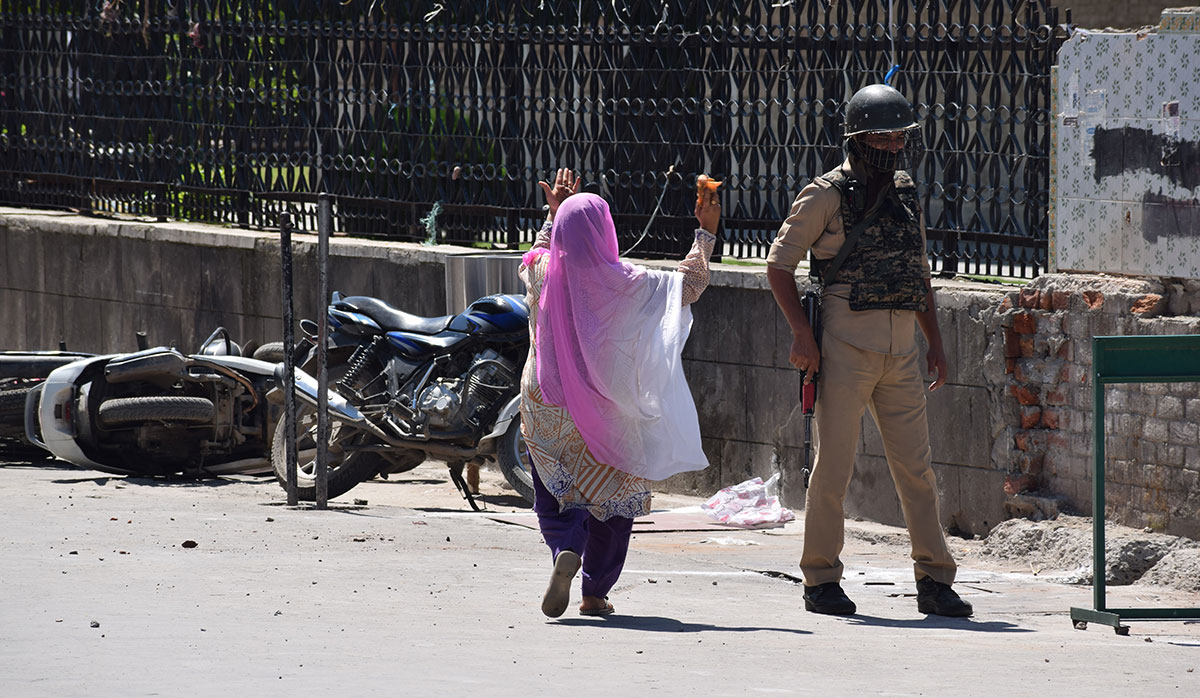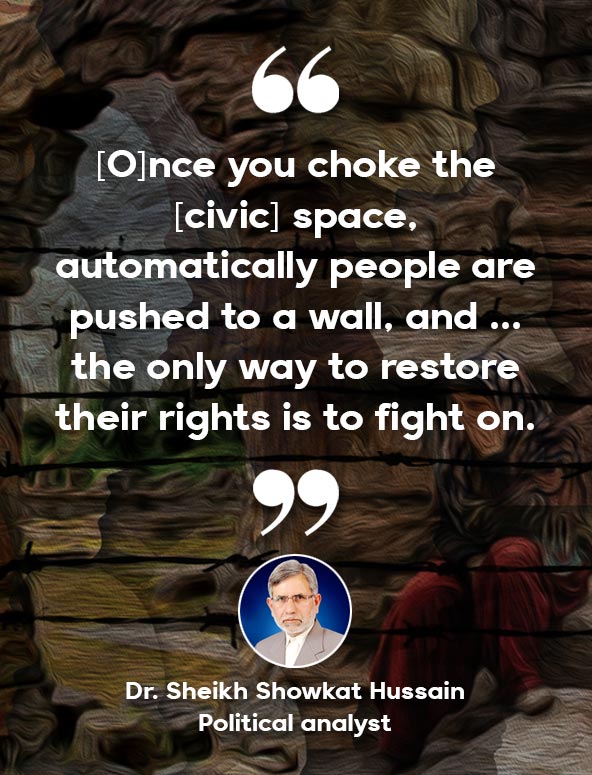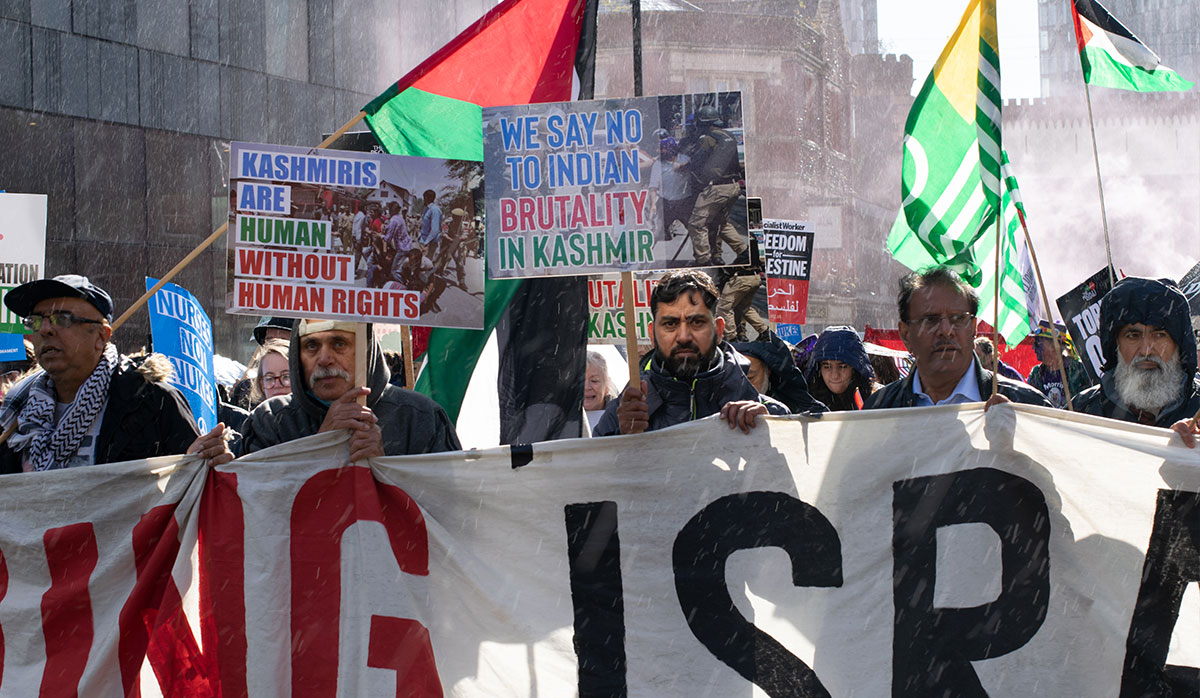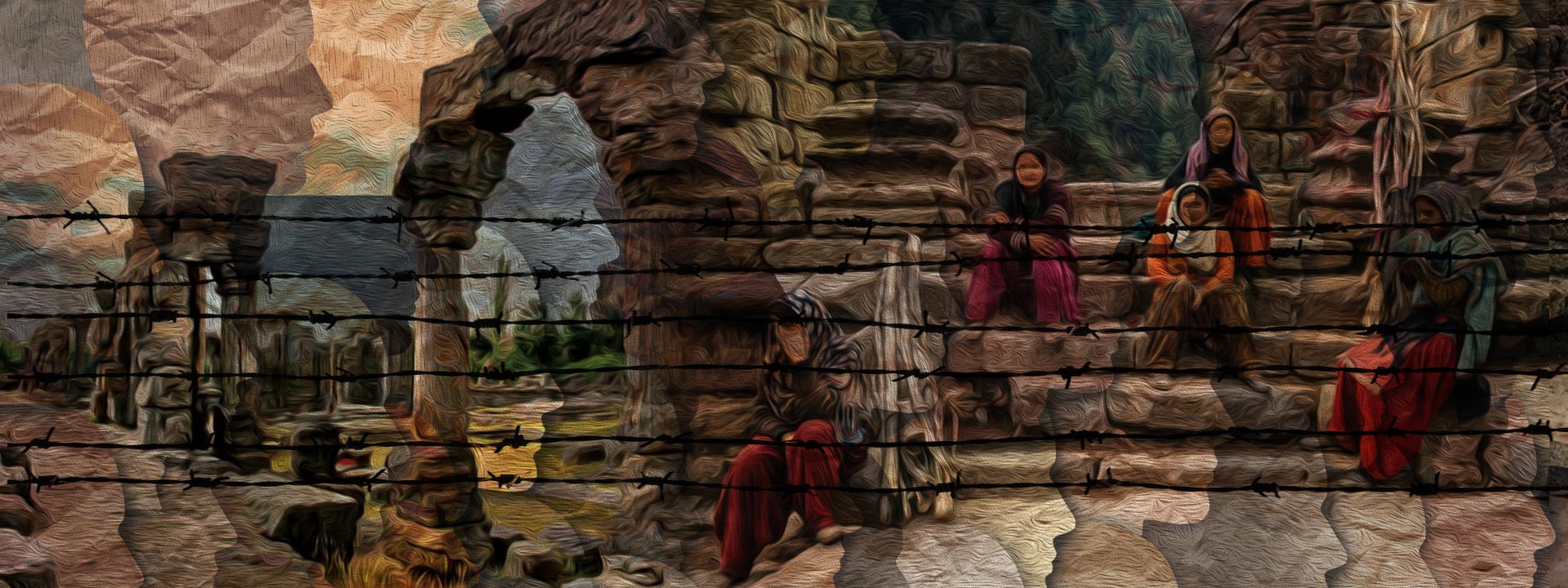Since the revocation of Article 370 of the Indian Constitution that granted a special status to Indian-administered Kashmir, India has passed several laws and implemented new policies that critics say will change the region’s demography. Despite claims that the move would bring prosperity and development to the region, Kashmir remains as poor as ever, if not worse, with 12.58% of its population languishing in poverty.
Asia Democracy Chronicles contributor Aamir Ali Bhat talks to Dr. Sheikh Showkat Hussain, Kashmir-based political analyst, writer, and scholar of human rights and international law, on his insights on the situation in Kashmir today.
The transcript below of their conversation has been edited for conciseness.
AAMIR ALI BHAT:
New Delhi is consistently claiming that they are building Naya Kashmir, which means New Kashmir, where development, peace, and prosperity are prevailing. Are these claims true? What is the situation of Indian-administered Kashmir at this moment?
SHEIKH SHOWKAT HUSSAIN:
There is nothing new about it. Once they replaced Sheikh Abdullah (who served as prime minister from 1948 to 1953) with Bakshi Ghulam Mohammad (1953 to 1964) also claimed that he was building a new Kashmir for development. And for a while, it seemed that he was trying to develop (it). But this myth of development exploded in 1963 once the holy relic from the Muslim shrine at Hazratbal (Srinagar) was displaced and people came to streets and (protested the) dismantled whole structure. So, they [Indian authorities] are retrying the same thing, but it has failed in the past and it will fail this time because the actual aspiration of the people for resolution of the Kashmir dispute remains unaddressed.

A woman shouts pro-freedom slogans as clashes between some youth groups and government forces take place in 2018. Today, Jammu and Kashmir have yet to attain the freedom they are fighting hard for.
BHAT:
It has been claimed that new laws like domicile and land laws that (were) passed last year and implemented in Indian-administered Kashmir will change the demography of the region. What is your view about this?
SHOWKAT:
Actually, once they amended Article 370 and once that bill was moved in the parliament of India, it was made clear by the prime minister and the home minister … that the basic purpose of the change of this status (or autonomous status of Jammu and Kashmir) is to allow Indians living in different states of the country to settle in Kashmir and purchase land over there because until now it was forbidden.
That has been the basic purpose of the scrapping of the autonomous structure of Jammu and Kashmir.
BHAT:
Has the conflict escalated in Indian-administered Kashmir post-abrogation of the region’s semi-autonomous status, or has it really, as the ruling Bharatiya Janata Party claims, de-escalated?
SHOWKAT:
Actually, they were guided by their ideological understanding of the issue rather than the practical nuances of the Kashmir dispute. They never anticipated that China will react to it. They never anticipated that the people — those who were holding the flag of India over here — will be disillusioned. Their rhetoric often asserts that they have achieved something whereas on the ground they have achieved nothing apart from dismantling the legal framework that managed the Jammu and Kashmir for so many years. This has created a lot of a sense of insecurity over here.

BHAT:
Since April 2020 authorities in Kashmir have been using the global public health COVID-19 pandemic as an excuse to bury armed rebels quietly in faraway graveyards so as to prevent large gatherings of mourners. As things stand today, the families continue to demand permission for a proper burial for their loved ones at their ancestral graveyards, but the authorities won’t budge. Does this violate any international law?
SHOWKAT:
Denial of burial rights to those who are fighting Indian state or civilian is basically not only against the Geneva Convention relating to armed conflicts … but also against the Indian Constitution. It has been time and again mentioned by different courts within India that the right to burial is a fundamental right and it can’t be scrapped.
BHAT:
And what will be the outcome of this new strategy [of scrapping the region’s special status and denial of burial by families of slain Kashmiri combatants]?
SHOWKAT:
Before scrapping up the special status of Jammu and Kashmir and before the denial of dead bodies to the families of the militants, we had insurgency mostly confined to rural areas and now it has spread even to urban centers. Srinagar has become a hotbed of militancy. It is obvious that the strategy has not worked.
BHAT:
According to reports, more than 2,000 people in Kashmir have been booked under the Unlawful Activities Prevention Act (UAPA) since 2019. This law enables the state to detain someone without a charge and without that person being tried in a court or convicted over a period of 180 days. Why has this law has been extensively used in Kashmir, especially after the abrogation of its semi-autonomous status?
SHOWKAT:
It is not only the UAPA but several other laws that remained in Jammu and Kashmir for a long time, like the Armed Forces Special Powers Act, or Disturbed Areas Act, (and the) Public Safety Act. All these legislations have been used extensively to suppress dissent over here. The only new thing that has been added is that they arrest people, and they send them to jails outside the state, and this is the added dimension, though we have instances of it being used previously as well.
Previously they were used in isolated instances, but now they are used extensively, and people are being picked up without any reason (or) merely on the basis of suspicion and are detained under UAPA and such other laws. This is a huge problem and a humanitarian problem, and the world needs to attend to it because once you choke the (civic) space, automatically people are pushed to a wall, and they feel that in the indifferent world, the only way to restore their rights is to fight on. So, instead of curtailing, curbing the spirit of insurgency, it cultivates it and that is the tragic part of it.
BHAT:
Over the years, so many people especially journalists, and social media users were summoned by police and threatened. Are these new tactics adopted by the government to silence people?
SHOWKAT:
Obviously, every tactic of harassing a journalist, denial of advertisements to newspapers, or censoring them, whatever they publish, remains an old tactic. After 2019, whatever was left in the form of print media, that, too, has been curbed and snatched from people. And, unfortunately, those who snatch it, those who stopped (free) expression of people, they believe it is helping them, whereas history tells us that it has never helped, even in India. The system believes that by choking the voice, by not allowing the dissent to get reflected within print or electronic media, they will be able to curtail dissent. But history tells us that such tactics, instead of curtailing, they trigger it and dissent then assumes such forms which are not desired by those who try to choke the space of media.
BHAT:
Scores of government employees were terminated from their service (in 2021) in Kashmir. The dismissed employees say that they have not been given any chance to defend themselves and counter the allegations leveled against them. However, LG Manoj Sinha, who acts as a top administrator in Kashmir, said that action will be always taken against those who promote “secessionism” and “terrorism” in the Union Territory. The termination order of employees also said that the dismissal is “in the interest of the security of the state” and that “it is not expedient to hold an inquiry.” Is it justifiable to terminate a government employee “in the interest of the security of the state” without informing the employee and holding any inquiry?
SHOWKAT:
Once you deprive a person of his livelihood you are, by your Constitution, required to give him a chance of being heard. Unfortunately, this is not being adhered to and authorities brazenly talk about it since they act against the security, therefore we do not give them a chance of being heard. But by saying, though, they are trampling (on) their Constitution and rights guaranteed within it.

Protesters in Manchester in the United Kingdom march in October 2021 to speak out against the military brutality against Kashmiris.
BHAT:
A prominent human rights defender, Khurram Parvez, was recently detained and sent to Delhi. Why is India tightening the noose on human rights groups in Kashmir? What will be its impact?
SHOWKAT:
It is not that they are tightening the noose around human rights activists for the first time. We have instances of human rights activists being targeted in the past as well — Jalil Andrabi, Dr. Ashai, and so many (other) human rights activists. Now, this time, they have extended it to Khurram Parvez as well. So, what is happening this time is an extension of the same policy. They have never been tolerant of human rights over here. I have been teaching human rights. We had a diploma course in human rights at Kashmir University. We had discontinued because the government didn’t favor its continuation.
BHAT:
Dr. Showkat, we have seen a rise in targeted killings in Kashmir in which some Hindus, outsiders, and Muslims were targeted by suspected militants. And we have also witnessed after scores of encounters families claimed their members were killed in staged gunfights. Are the horrors of the 1990s back in Kashmir? (Note: The 1990s was the peak of armed insurgency in Kashmir. During this period, the death toll rose to over 70,000, with thousands more “disappeared.”)
SHOWKAT:
It is worse than the early 1990s because at that juncture the insurgency was manifest. Political leaders were free, and they also wielded some influence upon insurgents. At this juncture, nothing is clear, and killings are going on without any break — be those killings by the security forces or from the other side. And this has created a sense of fear among all people. People don’t know how to cope with this situation because no one knows who this unknown gunman is, who is targeting the civilians, and why civilians again become targets of the security apparatus as well. This is a mysterious situation that is pushing Kashmir to a worse situation than in the early 1990s.
BHAT:
If so many things are happening in Kashmir, then why are people not protesting?
SHOWKAT:
Dissent doesn’t manifest the way it used to manifest itself. There was dissent recently — Hurriyat (separatists) gave a call after Hyderpora (in Srinagar) killings and there was an overwhelming response to that call. It is not that people are not protesting. Since the media is choked, it doesn’t (seem) that people are not. ●
Aamir Ali Bhat is a journalist in Indian-administered Kashmir. He writes about human rights violations, politics, and the environment.



















